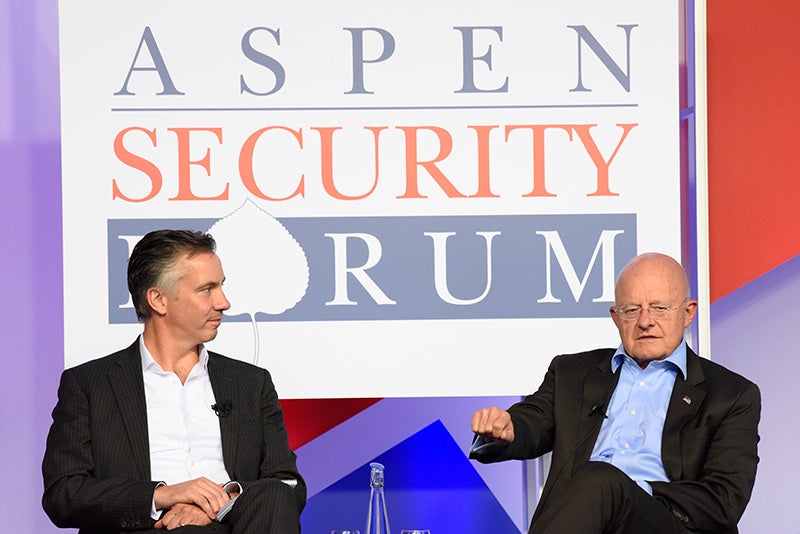
Jim Sciutto, chief national security correspondent at CNN, left, with James Clapper, director of National Intelligence (Photo Credit: Daniel Bayer/The Aspen Institute)
An unaccustomed air of foreboding hangs over this week’s Aspen Security Forum, an annual gathering of the nation’s top past and present defense, intelligence, counter-terrorism and diplomatic figures who are focused on protecting the American homeland.
“Are we safer now than five years ago?” asked Jeff Stern, a veteran participant, who is now responsible for protecting Virginia’s critical infrastructure. “I’d have to say, no.”
Former Homeland Security inspector general Clark Kent Ervin, who conceived this gathering seven years ago in the backwash of 9/11, feels the change in mood. “All these recent terror attacks on soft targets, the growing cyber attacks, suggest this is the new normal, and it’s going to be with us for a while,” Ervin told me. “People are scared, and they have legitimate reason to be. ”
“We’ve got all these evolving threats coming at us, and it’s disturbing that we did not see around the corner and anticipate this two years ago.”
Many of the non-government attendees, part of the vast Homeland security complex that has grown up since 9/11, told me they sensed the same. “It does feel different than past years because of the complexity and diversity of large problems that are out there to solve,” said David Hoffman, Intel Corporation’s director of global security and privacy policy. “In past years, there were two or three issues. This year there are something like eight.”
“What’s more, they are all interconnected,” he said, “The Turkey coup relates to our Russia problem, and that connects to Syria and ISIS and Iran, and cyber affects them all. The more these issues become connected, the more unpredictable they become and the greater the ripple effects.”
Two heightened threats got a lot of attention here:
- The sudden upsurge of self-radicalized Muslim terrorists inside the U.S. and Europe, with their evolution toward extremism over the Internet largely shielded from U.S. intelligence by privacy laws. A number of panels wrestled with this question, with few hopeful solutions and no data to back up claims of success.
Americans are going to have to get used to this as the new normal, Director of National Intelligence James Clapper said Thursday. “I don’t think an attack like 9/11 is in the cards,” he said. “But these smaller attacks have disproportionate psychological impacts. They have a contagious effect, and incite others to do the same thing.”
- Another disturbing development: Russia’s growing use of money and propaganda to sow political discord in its European neighbors. And then last week came the strong suspicion (not yet officially confirmed) that Russia was behind the hacking and release of Democratic National Committee emails. The news had an immediate impact on the American political system, and resulted in the forced resignation of DNC chair Debbie Wasserman Schultz on the eve of the party’s convention.
While declining to confirm the accusation against Russia, Clapper did say Russian president Vladimir Putin has a motive to manipulate U.S. politics because he believes the U.S. did the same, fomenting “color revolutions” in Eastern Europe and among opposition forces in Russia itself. Whoever was behind it, such attacks aren’t going to end.
“As we move closer to the Internet of things, our vulnerability becomes ever greater,” CIA director John Brennan said this evening. The U.S. public, the private sector and government have to come to agreement on how to accommodate both security and privacy “in this new frontier.” The alternative, he said, is mayhem in every sphere.
My takeaway from this gathering — Americans have to develop more resilience, as the British did during 30 years of Irish Republican Army attacks on the UK mainland. As Homeland Security Secretary Jeh Johnson put it: “Terror cannot survive if people refuse to be terrorized.”
Margaret Warner is chief Foreign Correspondent for PBS NewsHour.
This piece originally appeared on the PBS NEWSHOUR WEBSITE.

